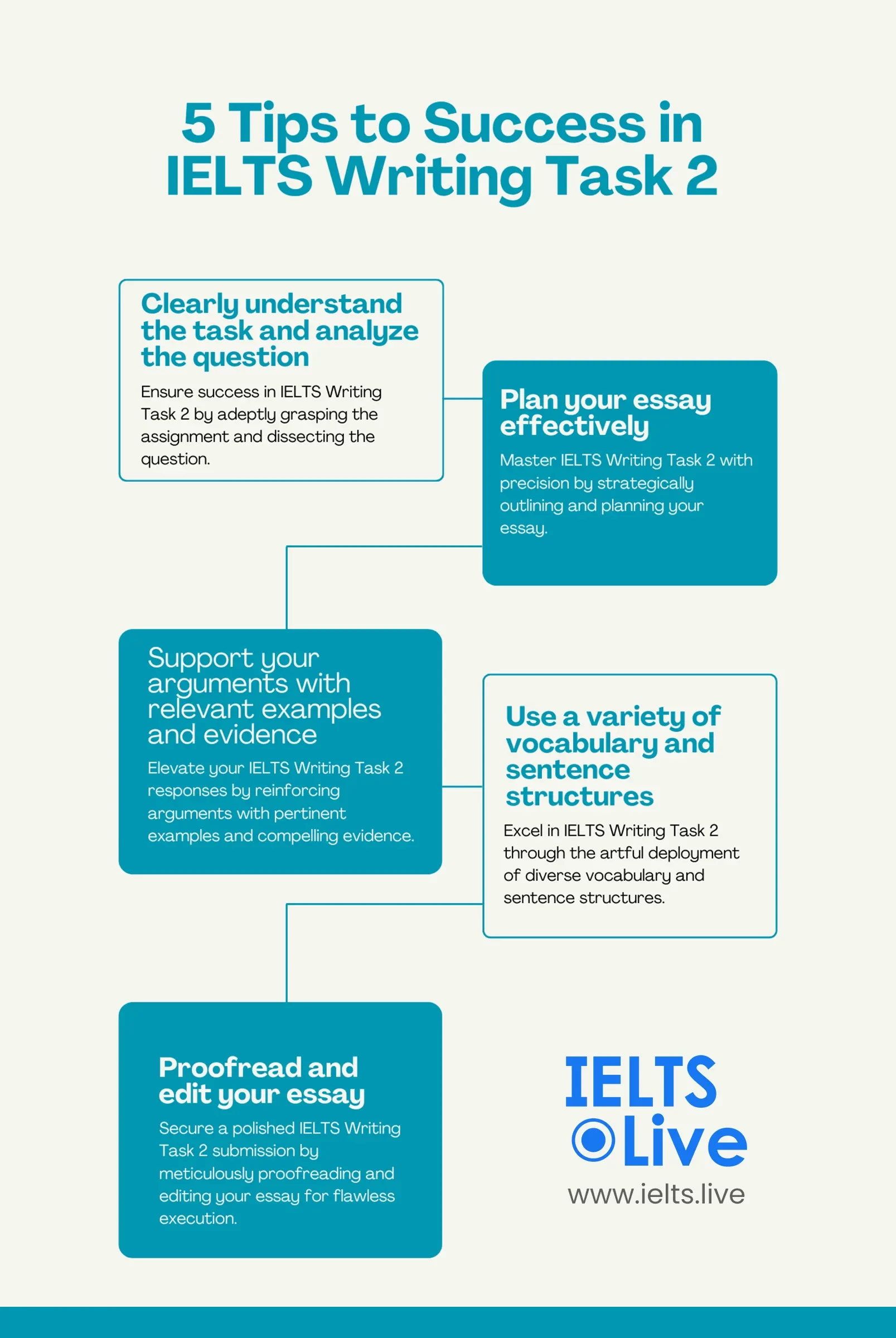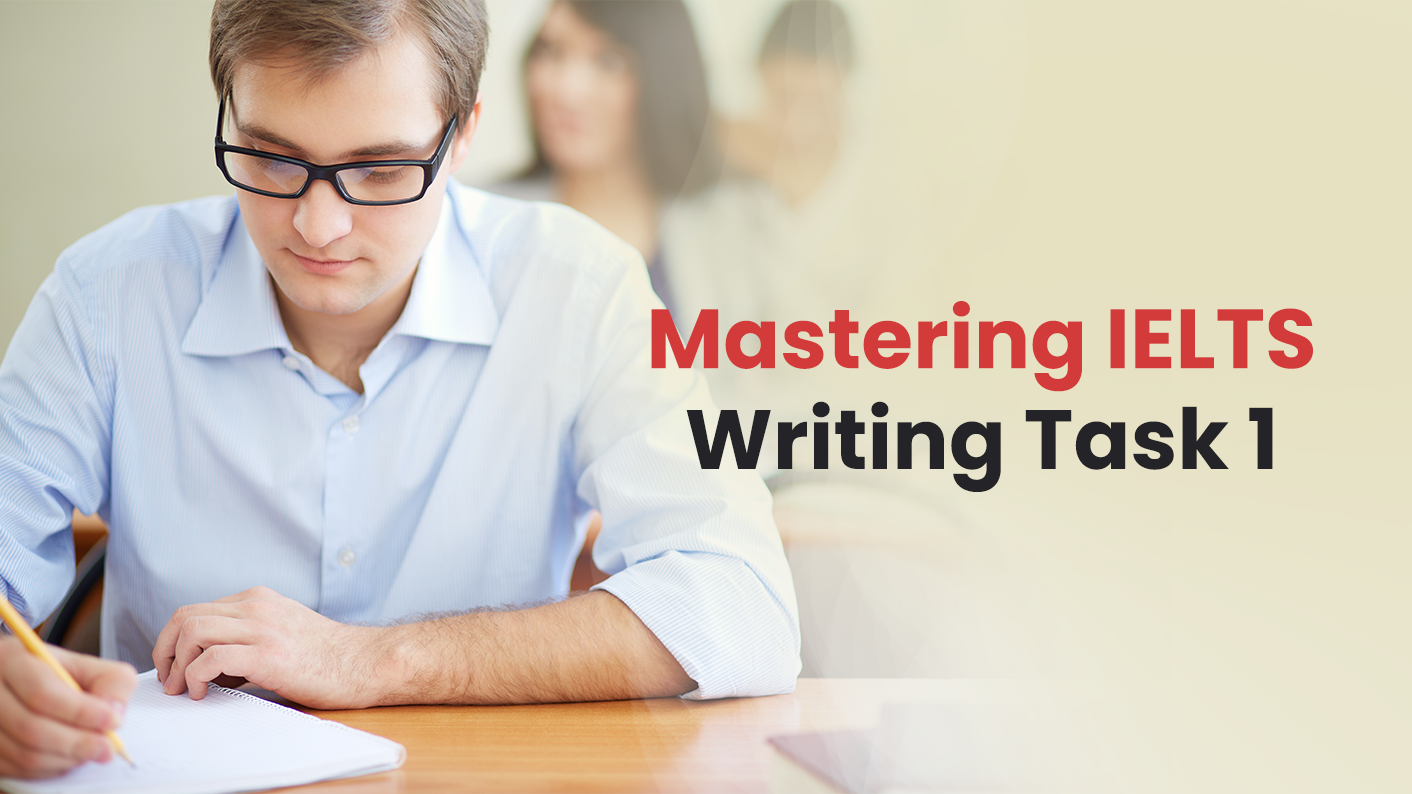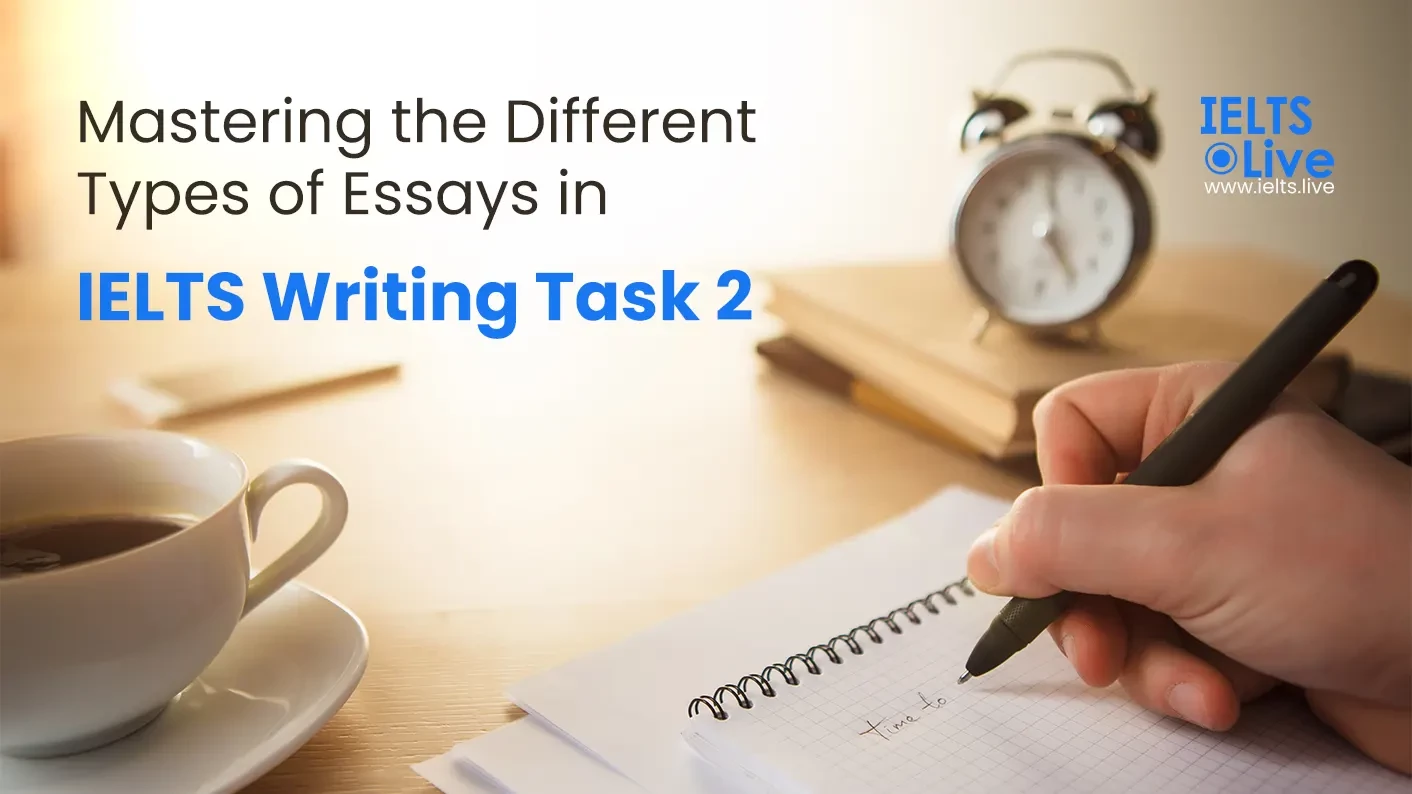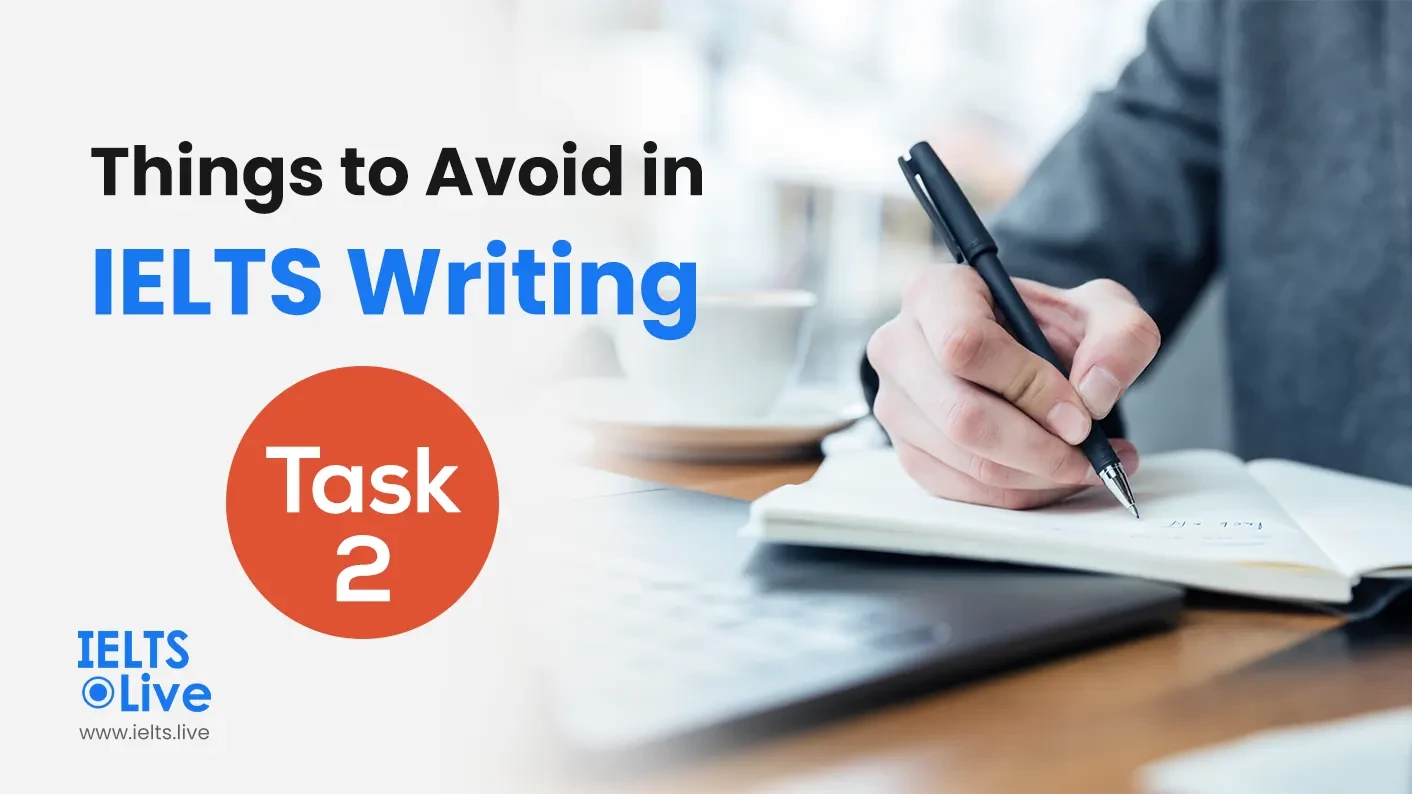
In IELTS Writing Task 2, you'll encounter a point of view, argument, or problem that requires you to compose an essay. Your writing should maintain a formal tone, be a minimum of 250 words, and ideally, you should finish within 40 minutes.
To do well in this part of the IELTS test, you need a smart approach. In this guide, we'll break down the "5 Things You Must Do in IELTS Writing Task 2.
These tips will help you understand the questions, build strong arguments, and boost your chances of getting a good score.
You may also like: Maximizing The Final Five Minutes Of Your IELTS Writing Test: A Comprehensive Checklist
Clearly understand the task and analyze the question
- Read the question carefully and underline keywords: IELTS Writing Task 2 requires you to thoroughly read and understand the subject matter of the question. You can better understand the primary idea of the prompt by underlining important terms. Consider the following question, for instance: "To what extent do you agree or disagree with the statement that technology has more positive than negative effects on the society?" You can narrow down the scope of your response by identifying the terms "technology," "positive," "negative," and "society."
- Identify the type of essay required (e.g., opinion, advantages/disadvantages, problem/solution): You need to understand what type of essay you're being asked to write. Whether it is an opinion-based essay, an advantage-disadvantage essay, or a problem-solution essay. For instance, if the prompt asks for your view on a certain subject, such as "Should the government provide free education?" you would need to clearly state your opinion and provide relevant justifications.
Let's use the following prompt as an example: "Some people argue that globalization has done more harm than good. Discuss both perspectives and provide your thoughts." The phrases "globalization," "harm," "good," and "both sides" in this sentence suggest that you should consider both the advantages and disadvantages of globalization before stating your own opinion.
Plan your essay effectively
- Brainstorm ideas and create an outline: For a piece of writing to be cohesive and well-organized, planning is essential. After you have grasped the subject and noted down its main points, it is time to generate thoughts and draw an outline. It helps to keep your mind organized and ensures a logical flow in your work.
Make notes of key justifications, illustrations, and proof during the brainstorming stage for each primary point. If the question is about how social media affects society, for instance, you might come up with ideas like enhanced connectivity, information distribution, privacy problems, and addiction. These concepts can create the basis of the paragraphs in your essay.
- Organize your essay into clear paragraphs with a logical structure: After brainstorming, create a framework outlining the key ideas you'll cover and the sequence in which you'll present them. An introduction, body paragraphs addressing various topics, and a conclusion serve as a common essay structure. This plan gives you a road map to keep you on track and ensure a logical flow throughout your essay.
Let's use a question about the benefits and drawbacks of online purchasing as an example. In your outline, you might have an introduction that emphasizes how popular online shopping is, body paragraphs that describe how convenient it is, the variety of things available, and potential risks, and finally a conclusion that summarizes everything and expresses your point of view.
Support your arguments with relevant examples and evidence
- Use real-life examples, statistics, or studies to support your claims: To strengthen your arguments and demonstrate a deeper understanding of the topic, it is crucial to support your ideas with relevant examples and evidence. By doing so, you give your essay greater credibility and demonstrate to the examiner that you can use what you've learned in real-life situations.
When giving examples, try to use a mix of relevant data, studies, and experiences. For instance, if the topic concerns the effects of climate change, you can give specific illustrations of how it affects ecosystems or provide statistical information on the increase in global temperatures.
- Ensure the examples are directly related to the topic and effectively illustrate your point: By including relevant examples, you provide actual proof that supports your views and adds depth to your arguments. This demonstrates your ability to analyze and use knowledge in a meaningful manner. Always make sure that the examples you use to illustrate your points are relevant to the topic of your essay.
For instance, if the question is about the advantages of renewable energy sources, you could cite a study outlining the financial benefits of solar power or give examples of nations that have successfully made the switch to renewable energy sources.

Use a variety of vocabulary and sentence structures
- Demonstrate a wide range of vocabulary to showcase your language skills: Use a variety of vocabulary and sentence patterns to prove your language proficiency and produce an essay that is more interesting to read. Showcase your language skills by applying appropriate words and phrases to describe your ideas. Make sure to use more subtle and nuanced expressions instead of monotonous words. For example, instead of repeatedly using the word "good," you may use synonyms such as "beneficial," "advantageous," or "favorable."
- Use complex sentence structures, such as conditional sentences or passive voice, to add depth to your writing: To give your writing depth and detail, use a variety of sentence structures in addition to your vocabulary. Use sentence types, such as simple, compound, complex, and compound-complex sentences. This improves your essay's overall quality and makes a good impression on the examiner.
Proofread and edit your essay
- Check for grammatical errors, spelling mistakes, and punctuation errors: Spend time editing and proofreading your essay when you have finished writing it. This makes sure your essay is flawless, logical, and cohesive. First, make sure there are no grammatical, spelling, or punctuation errors. Pay close attention to the sentence structure, verb tenses, word forms, and subject-verb agreement. Your essay's credibility and clarity can be significantly impacted by poor grammar and spelling.
- Ensure your essay is cohesive, coherent, and follows the conventions of academic writing: Second, evaluate your essay's general coherence and cohesion. Verify that the claims make sense and that your ideas flow smoothly from one paragraph to the next. To connect your thoughts and build a coherent story, use transitional words and phrases.
Finally, go through the layout and structure of your essay. Make sure you have an interesting opening which clearly states your point of view and explains the topic. Ensure that each of the body paragraphs in the essay concentrates on a single primary idea and offers supporting details. Summarize your essay's main points and, if necessary, restate your position in the conclusion. By thoroughly proofreading and editing your essay, you can get rid of errors, boost clarity, and create a polished end result that successfully communicates your thoughts.
Following these do's is a must for success in IELTS Writing Task 2. You can develop a solid framework for your writing by understanding the assignment, analyzing the essay question, and carefully arranging your response. Use a wide variety of vocabulary and sentence patterns, back up your points with appropriate examples, and proofread your essay. Maintain the word count, offer a fair perspective, abstain from memorized responses, and cover all areas of the assignment. You may face IELTS Writing Task 2 with confidence if you practice and stay dedicated.
Good luck with your preparation!










0 COMMENTS